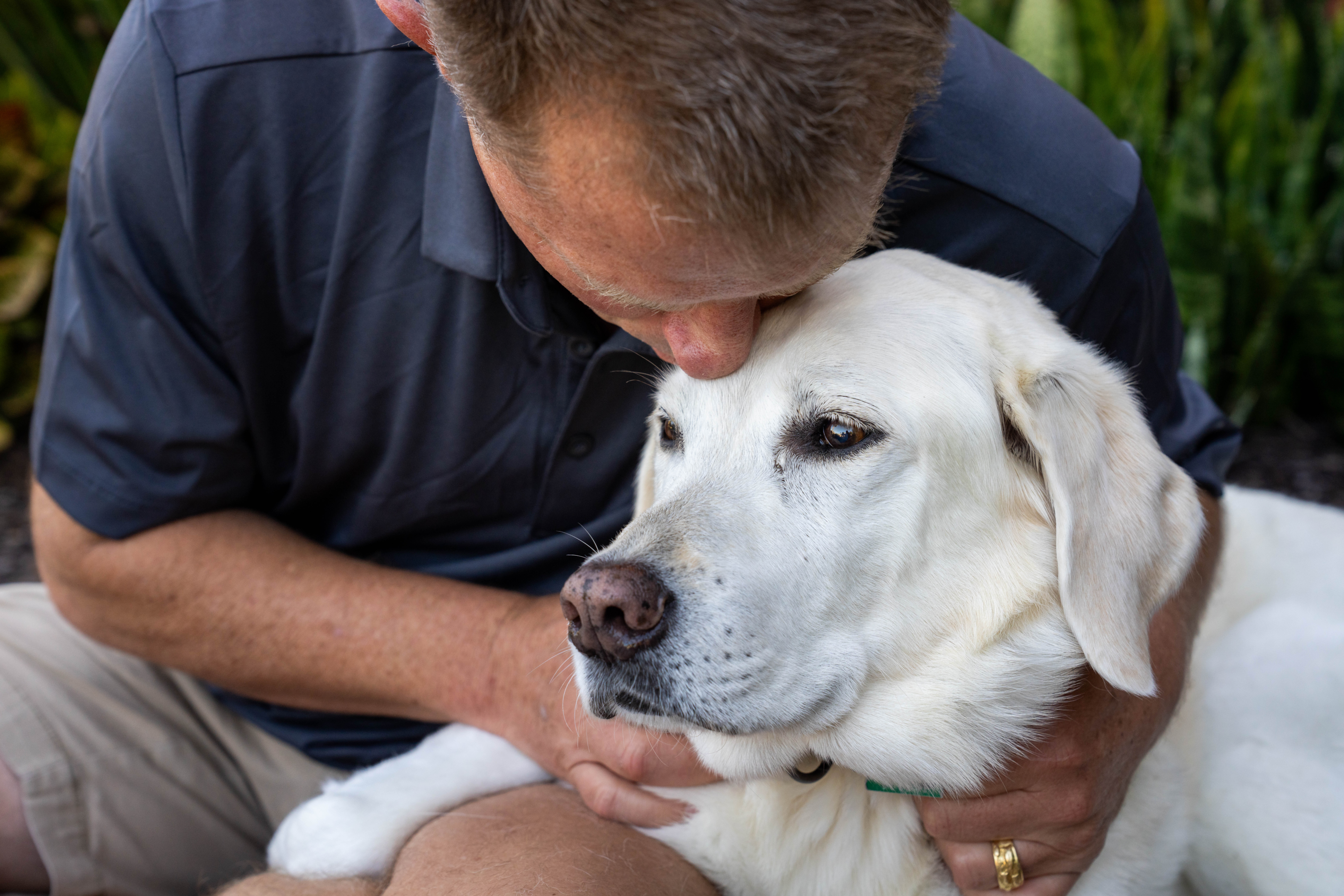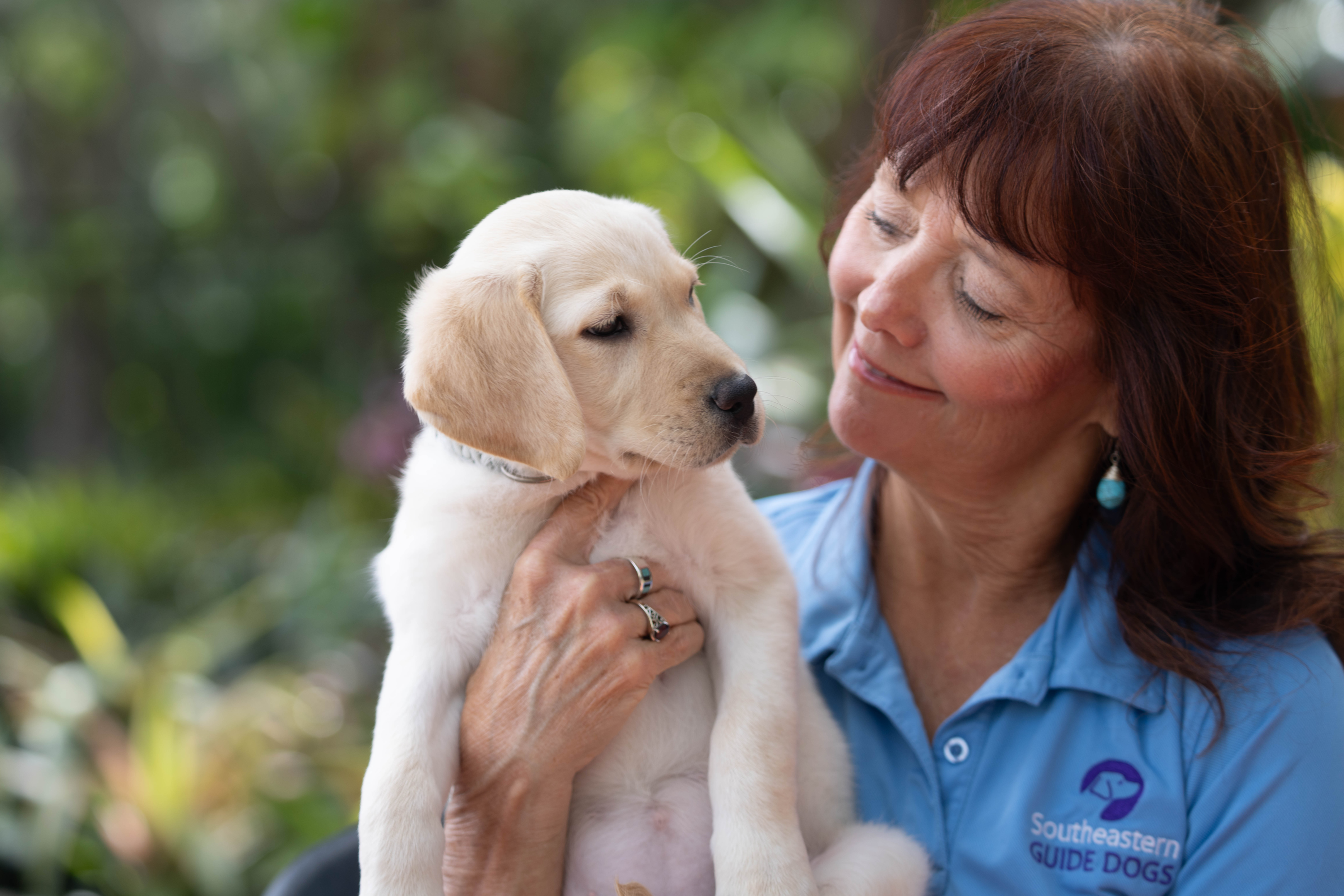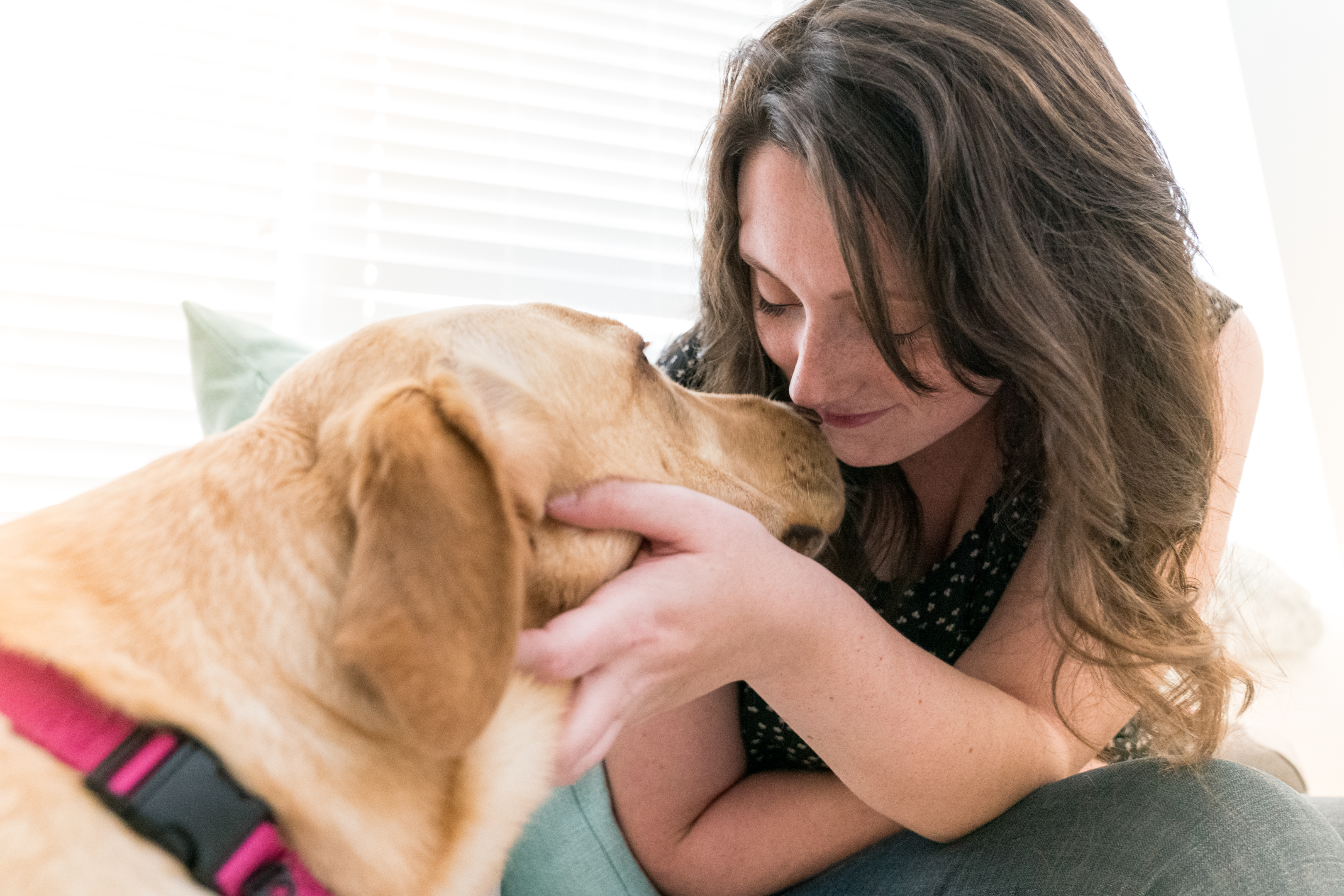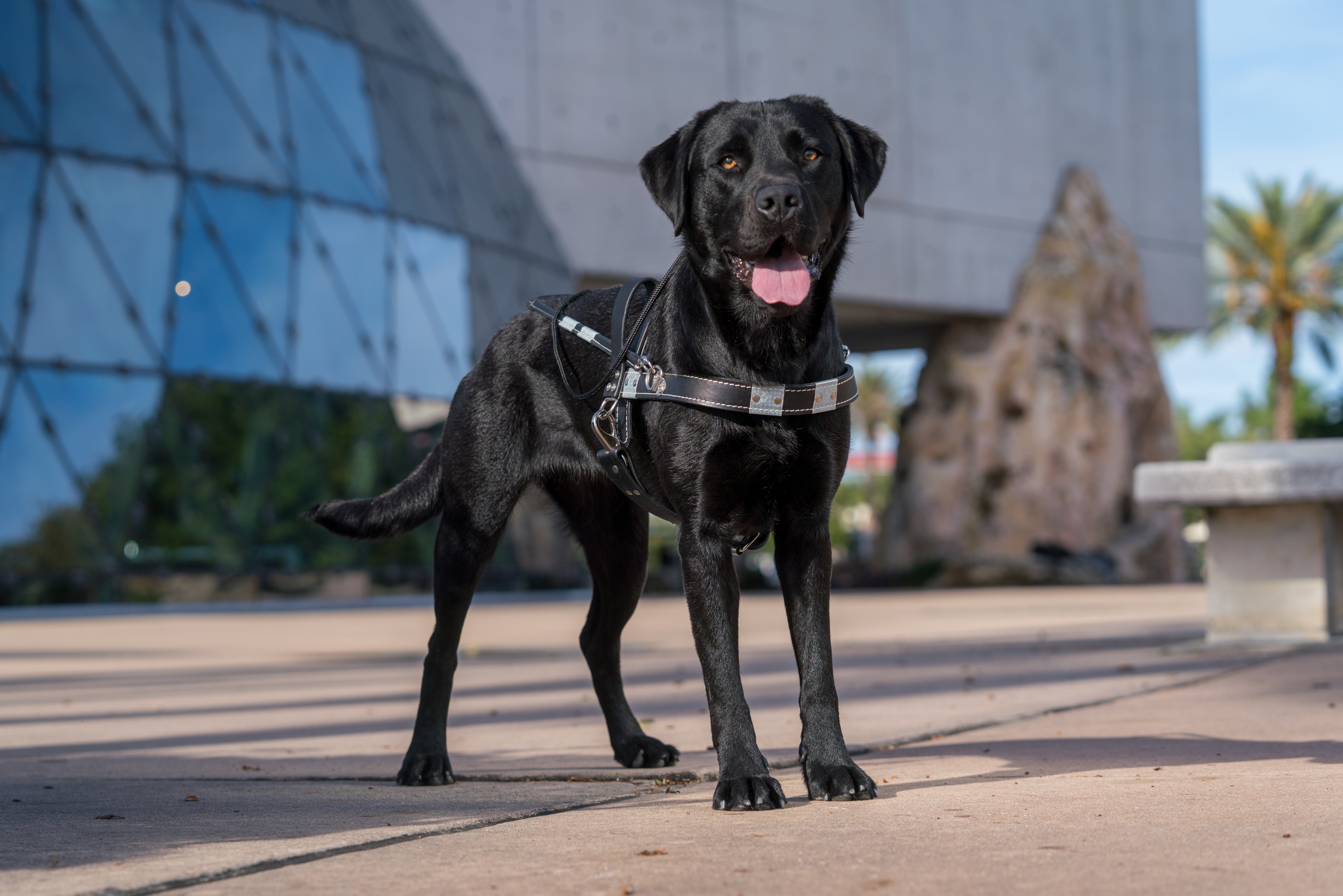
What Happens When a Guide Dog Retires? Exploring Their Life After Service

What makes our guide dogs so special?
At Dogs Inc, it starts with decades of selective breeding backed by science and genetics. Then we take bumbling, frolicking, bundles-of-joy puppies and add in thousands of hours of training, care, and, best of all, love. These dogs are healthy, eager to please, and ready to go.
Every guide dog begins learning at just two days old, as they quickly discover that humans are their best friends. We socialize and expose them to the big wide world as puppies, instilling confidence and resilience.
Before matching with their new favorite humans, guide dogs learn basic obedience and about 40 advanced skills at the hands of trained expert instructors. Next, it’s time for their handlers to learn what they’ve already mastered. That’s why we train them, too!
Harness on? Guide dogs love to work. Harness off? Their handlers have themselves a playmate and companion, ready for belly rubs, snuggles, and a run around the yard. And a nap, maybe with a snore or two—until a handler says those magic words: “Let’s go!”

Going to Work
Every guide and service dog from Dogs Inc plays a crucial role in the life of an individual with visual impairment or a veteran with post-traumatic stress disorder—providing them with the confidence, independence, and mobility they need to navigate the world.
Although they love to work, our extraordinary guide and service dogs eventually reach a point where they can no longer perform their duties effectively due to age or health concerns, just like humans. There’s a lot to learn about retirement for guide and service dogs!
Why would a guide dog retire early?
Working as a life-changing guide or service dog requires excellent physical health. An older dog often slows down or exhibits physical signs that it is ready to transition to the life of a pampered pet in a loving home.
The retirement age for guide dogs varies depending on several factors, including their health and work performance. On average, guide dogs usually retire between the ages of 8 and 10 years old. However, this can vary, as some dogs may retire earlier due to health issues like joint problems or vision impairment.
Additionally, changes in the handler’s lifestyle or needs, such as a career change or relocation, may also prompt an early retirement for their guide dog.
Recognizing the Signs of Readiness for a Guide Dog’s Retirement
Handlers develop deep bonds with their loving, four-legged companions. They understand their remarkable dogs’ needs and can recognize when it’s time for retirement. What happens to these incredible animals once they say farewell to their former working careers?
Suzy Wilburn, a guide dog handler and Dogs Inc’ head of ambassador outreach recruitment, explains that dogs usually work for an average of eight years, but this can vary. Signs of retirement in a working dog can include hesitation when putting on the harness, a decrease in speed, or an increase in mistakes.
These subtle changes often come with old age or health problems and indicate that the dog is ready for a well-deserved retirement in their golden years.
What is the life expectancy of a guide dog?
The life expectancy of a guide dog can vary depending on factors such as breed, overall health, and genetics. On average, guide dogs tend to have a life expectancy of around 10 to 14 years.
However, it’s important to note that individual dogs may have different life spans, and some may live longer or shorter lives based on various factors.

Guide Dog Retirement is a Very Emotional Decision
Retiring a guide dog is a complex and emotional decision for both the handler and the dog. The connection they share is incredibly strong, and parting ways can create a profound sense of loss.
However, the primary consideration is the dog’s welfare and quality of life. Once the guide dog retirement decision is made, the handler has several options to ensure their retired guide dog is well-cared for.
Option 1: Keeping the Retired Guide Dog
Some handlers choose to keep their retired service dog or guide dog as a pet. This option allows them to continue lavishing love and care on their loyal companion while also transitioning into a successor guide dog if needed.
This decision requires a big commitment to managing the health and well-being of both a retired dog and new dog effectively. If two dogs are too much for a handler to care for, they might consider the next few options.
Option 2: Adopting Within the Family or Friends
Sometimes, the handler cannot keep their retired guide dog as a personal pet. In this case, they may offer the dog to a family member or a close friend. When this happens, the retired dog stays within their social circle, enabling frequent visits and ongoing attention from someone who really loves the dog and knows its history and personality well.

Option 3: Reuniting with the Puppy Raiser
The puppy raisers who volunteer their hearts and homes to our puppies forge a special relationship with them that carries on after they are matched as guide or service dogs. Puppy raisers are proud foster parents who want to see their furry, four-legged children succeed and live happily.
Often, the puppy raiser elects to adopt the retired guide dog or retired service dog, completing a heartwarming circle of love. These beautiful reunions benefit the retired dogs (no matter how much time has passed, older dogs never forget the people who raised them) and bring joy and fulfillment to the puppy raisers.
Option 4: Placing the Retired Guide Dog in a Loving New Home
Dogs Inc always steps in to find a suitable adoptive home for a retiring guide or service dog. Highly skilled and well-trained, these are very adoptable dogs!
We maintain a carefully vetted waiting list of individuals eager to provide a caring home for a retired guide dog. Thorough screening and assessment processes ensure that the dog is placed in a safe, stable, and suitable environment.
Continuing Alumni Support for a Successor Dog
Our guide dog school prides itself on offering lifetime follow-up for all of our guide and service dog graduates. including throughout the retirement process. Dogs Inc provides ongoing support to handlers as they apply for a successor dog, too.
This alumni support network guarantees a smooth transition and provides guidance and assistance in the selection of and training with a new guide dog. Whether it’s remaining with the handler, reuniting with the puppy raiser, or finding a new adoptive home, the well-being of every extraordinary animal is our top priority.

Conclusion
Faithful, loving, and true, our dogs leave a legacy of unwavering loyalty and unmatched dedication to their grateful handlers. No matter when they retire, their extraordinary impact changes lives for the better, reminding us of the power of remarkable intellect, top-notch training, and single-minded devotion. We couldn’t ask for anything more as these retiring heroes move into the sunset of their lives!

Learn More About Dogs Inc
Want to learn more about our mission—or even tour our campus? Discover how our guide dogs, service dogs, and skilled companion dogs bring hope to those facing significant challenges.
You Might Also Be Interested In:
How to Become a Guide Dog Instructor

